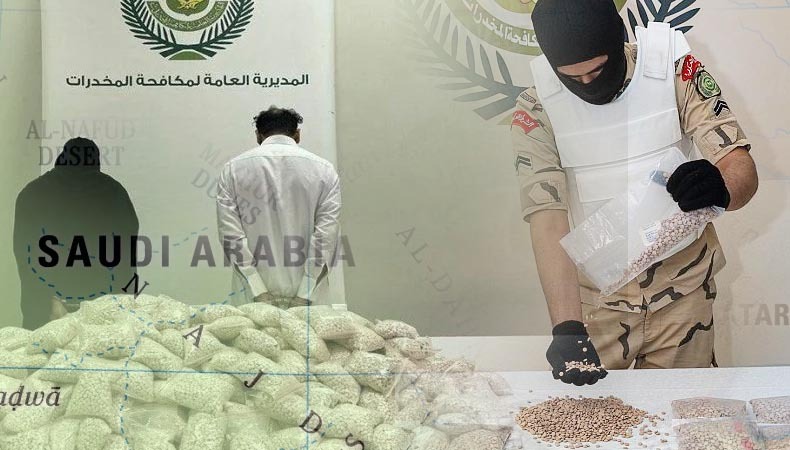Saudi Arabia en route to becoming drug capital of Middle East


Local newspapers reported that the police claimed he was under the influence of the drug shabu. Recently, Saudi media has raised concerns about the surge in drug use, with one columnist referring to drug shipments into the country as “an open war against us, more hazardous than any other battle.”
Following the discovery of roughly 47 million amphetamine pills concealed in a shipment of flour at a warehouse in the Saudi capital Riyadh on Wednesday, police there proclaimed the largest drug bust in their nation’s history.
According to experts, Saudi Arabia is increasingly playing the role of the Middle East’s drug capital, fueling demand and emerging as the main destination for traffickers from Syria and Lebanon, as evidenced by the record-breaking seizure.
They claim that the kingdom is one of the biggest and wealthiest regional destinations for drugs, and that situation is only getting worse.
The General Directorate of Narcotics Control claims that in terms of the quantity of drugs seized, Wednesday’s operation represented the largest single smuggling attempt. The United Nations Office on Drugs and Crime (UNODC) has previously stated that “reports of amphetamine seizures from countries in the Middle East continue to refer predominantly to tablets bearing the Captagon logo,” despite the fact that authorities failed to identify the drug they seized or the source.
Originally known as Captagon, this medication contained the artificial stimulant fenethylline. According to the European Monitoring Centre for Medications and Drug Addiction, counterfeit drugs with the name “Captagon” are frequently found in the Middle East even though they are no longer produced officially.
Related Posts
Drug busts in Saudi Arabia and other countries in the area have increased over time. 320 kilograms of amphetamine tablets and over 3,000 kilograms of hashish worth millions of dollars were taken from a fishing boat in the Gulf of Oman by a US Coast Guard vessel earlier this week.
According to Vanda Felbab-Brown, a fellow at the Brookings Institution in Washington, DC, who has written on the subject, the substance first gained popularity in the kingdom about 15 years ago but has gained greater traction in the last five years, “possibly becoming on par with cannabis.”
CNN’s request for comment was not answered by the Center for International Communication in Saudi Arabia. According to data from the International Addiction Review journal, the street value of captagon, if it was the same substance, could be up to $1.1 billion. The drug may be purchased for between $10 and $25 per pill.
According to Caroline Rose, a senior analyst at the New Lines Institute in Washington, D.C., who has studied the captagon trade, “captagon’s amphetamine-type properties are sought out as a coping mechanism that can aid users facing food insecurity in staving hunger, and inducing a euphoric “rush” that users have said to help with traumatic stress.” These same characteristics for captagon have reportedly been sought after by international personnel.
Amphetamines are preferred by Saudi youth despite the fact that hashish and khat are other widely used substances in the country. According to a user quoted in a 2021 study published in the journal of Crime, Law, and Social Change, “The captagon is compact. It appeals to me and my schoolmates more than hashish. Unlike hashish, which we may purchase in tablets. We can get one tablet and enjoy it once [our] parents have given us 25 riyals.”
According to Rose, “the drug has a different appeal in more affluent consumer markets, serving as a recreational activity among its growing youth population that, despite social reforms… has reportedly struggled with boredom amidst widespread youth unemployment and a lack of opportunities for leisurely activities.” Captagon is less stigmatized than “harder” substances like opioids and cocaine, according to some customers.
The greater liberties enacted by Crown Prince Mohammed bin Salman may assist to curtail some drug usage among Saudi Arabia’s youth, who frequently use drugs out of boredom and a lack of social possibilities, according to Felbab-Brown. “Educating young people is more essential than restricting freedoms or using concerts as locations for dragnets and raids.”







